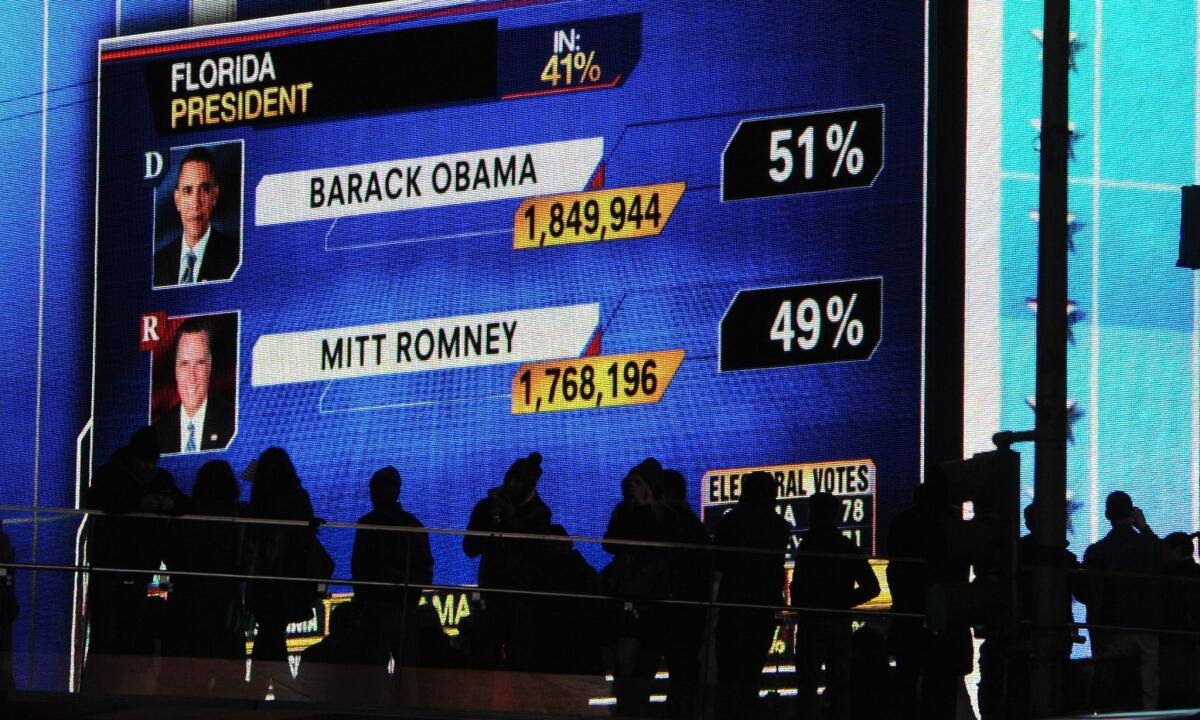President, by popular vote

By a fairly solid margin, Tuesdayâs presidential election spared Americans the hand-wringing that would have accompanied a split decision like that of 2000. George W. Bush, of course, won the electoral college that year but fell just short in the popular vote. This year, Barack Obama cruised to victory in the electoral college and won the electorate by about 3 million votes.
When a presidential candidate wins the electoral college but loses the popular vote â as Bush, Benjamin Harrison and Rutherford B. Hayes did â it does not diminish the legitimacy of the election. Each of those candidates won by the rules and went on to serve as president. Nevertheless, few Americans would deny that it is troubling and fundamentally undemocratic to be governed by a president who was opposed by more than half of his countrymen.
The electoral college, as it came to be known, was specifically designed to thwart the democratic impulses that alarmed the founders of the republic. Rather than permit a direct vote of the people â remember that âthe peopleâ in that era did not include women, blacks or the poor â the Constitution provided that the president would be picked by electors. Those electors would be chosen by the states and allocated according to how many congressional representatives were assigned to each state. The preferences of the people mattered not at all.
INTERACTIVE: U.S. election results
Happily, the expansion of the franchise is one of the noblest aspects of Americaâs political evolution. Today, many of those groups disenfranchised at the outset join in what Walt Whitman evocatively extolled as âchoosing day.â And yet the electoral college remains. There are efforts to replace it, and the 2012 election should once again propel those efforts forward, not to favor one party or the other but to broaden and deepen democracy for all.
There are at least two ways to accomplish that. One would be to abolish the electoral college altogether. But that would require a constitutional amendment, which would mean securing the approval of two-thirds of Congress as well as ratification by three-quarters of the states. In todayâs political climate, itâs difficult to imagine that kind of consensus being achievable.
The other route is more clever. It requires states to pass legislation awarding their electoral votes for president to the winner of the national popular vote. That legislation, however, would take effect only when states with combined electoral votes of 270 or more â the winning margin in the electoral college â sign on to the system. The practical effect would be to ensure that the winner of the popular vote also would win the electoral college, and thus become president. As of today, nine states, including California, with a combined 132 electoral votes have approved the idea.
COMMENTARY AND ANALYSIS: Presidential election 2012
That system would change the way presidential races are run. Had it been in place this year, for instance, Mitt Romney might have stumped in interior California to boost his popular vote there. Instead, he and Obama bypassed California because Romney knew he could not win it and Obama knew he could not lose it.
Meanwhile, they poured more than
$200 million into Ohio, spending so much time there that one election-night commentator remarked that it looked more like a race for governor of that state than for president of all the states. Thatâs the practical effect of the current system: It drives candidates and money to the handful of closely contested states, and encourages them to ignore the larger numbers of voters in California, New York, Texas and other populous states where the balance of power is so squarely on one side or the other that no amount of campaigning is likely to affect it.
That once may have conformed with a crimped view of voting and those permitted to influence the outcome. However, it offends modern sensibilities, and should be replaced by a system in which the winner of the popular vote becomes president of the United States.
More to Read
A cure for the common opinion
Get thought-provoking perspectives with our weekly newsletter.
You may occasionally receive promotional content from the Los Angeles Times.










